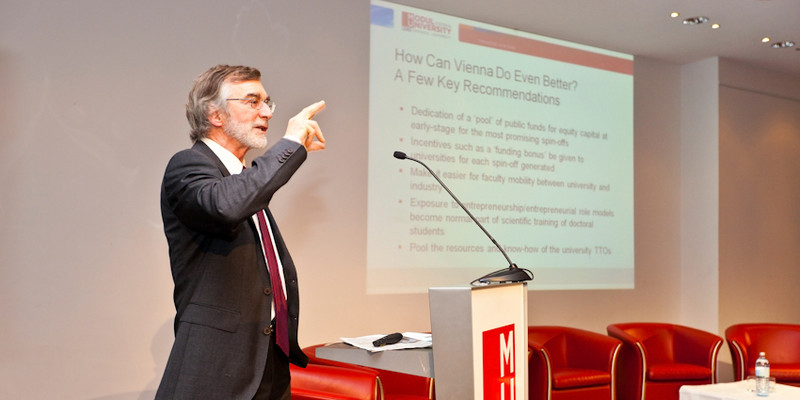Building a knowledge region: University spin-off generation in Vienna
The possibilities for creation of university spin -offs in Vienna are good - but the conditions can still be significantly improved.
This emerges from a study conducted by Modul University’s Department of Public Governance and Sustainability under the direction of Prof. Harvey Goldstein, head of the Department of Public Governance and Sustainable Development, which was presented to the public on Monday, December 10th to a packed house at Modul University Vienna.
A ‘spin-off’ has been defined as a new company whose technological/scientific basis came from a university-based (or joint university-industry) research project. In a comprehensive new study, the research of Prof. Goldstein and his team of Dr. Sabine Sedlacek and Dr. Verena Peer shows that university spin-offs have higher survival rate, are able to build upon existing regional strengths, and create synergy, energy, dynamism, and role models. Indeed, many of the most innovative gazelle companies began as university spinoffs e.g. Genentech (UC), Lycos (Carnegie-Mellon, Cisco Systems (Stanford), and Netscape (Univ. Illinois).
Their study addressed the question of what conditions stimulate or inhibit the creation of spin-offs in Vienna. They looked at the city as a ‘knowledge region’ considering that in the 21st century global economy, those regions which can grow and nurture clusters of innovative firms will be the most economically competitive and healthy. In building this region they identified key drivers to building this region: a supply of talented and creative scientists, engineers, entrepreneurs, productive infrastructure, effective institutions and institutional capacity, and sources of finance for investment.
So how well does Vienna do in generating university spin-offs? To answer their research question, they estimated the number of spin-offs generated in Vienna, and compare it to a benchmark region; in this case, Munich, Germany. Results show Vienna is basically on par with the benchmark region, generating about 110 spin-offs in the 2007-2012 period, or about 20 per year.
They identified the most critical obstacles and barriers to spin-off generation, finding that attitudes, motivations, incentives towards entrepreneurship are wanting. The lack of seed capital from universities and difficulty of finding angel investors and VC in the Vienna region, and a lack of a coordinated strategy among key partners (federal ministries, universities, and intermediary support, and funding organizations) also pose a problem.
Dr. Goldstein elaborated: “We’ve identified a range of barriers that hinder the creation of spin- offs in Vienna. We found them on three levels - among potential founders in the universities, and at the level of the city and the federal government." Specifically, the team identified a lack of managerial know -how and willingness to take risks in many university scientists. Although one might think that universities would counter these barriers with attractive offers for creation, the study proves the opposite: In numerous interviews, the lack of attractive incentives for the commercialization of research has been cited as an obstacle to a spin-off creation again and again.
Their study concluded with recommendations for future improvement, chiefly dedicating a ‘pool’ of public funds for equity capital at early-stage for most promising spin-offs, providing incentives such as a ‘funding bonus’ be given to universities for each spin-off generated, providing incentives for faculty to more easily move back and forth between university and industry, and proposing that exposure to entrepreneurship and entrepreneurial role models should become normal part of scientific training of doctoral students.
Additionally, they recommend building and maintain a shared database of resources available for the support of new technology-based businesses, creating a network of experienced entrepreneurs who would volunteer their time to provide guidance to would-be faculty entrepreneurs, and perhaps most important, reach a shared vision and coordinated strategy among the key actors for generating and nurturing spin-offs.
Study:
H. Goldstein , V. Peer , S. Sedlacek . Vienna as a region of Knowledge : Increasing the generation of University spin-offs. Final Report to the Vienna Chamber of Commerce ( WKW ) .
Download at: www.modul.ac.at/departments/public-governance-and-sustainable-development/projects/





